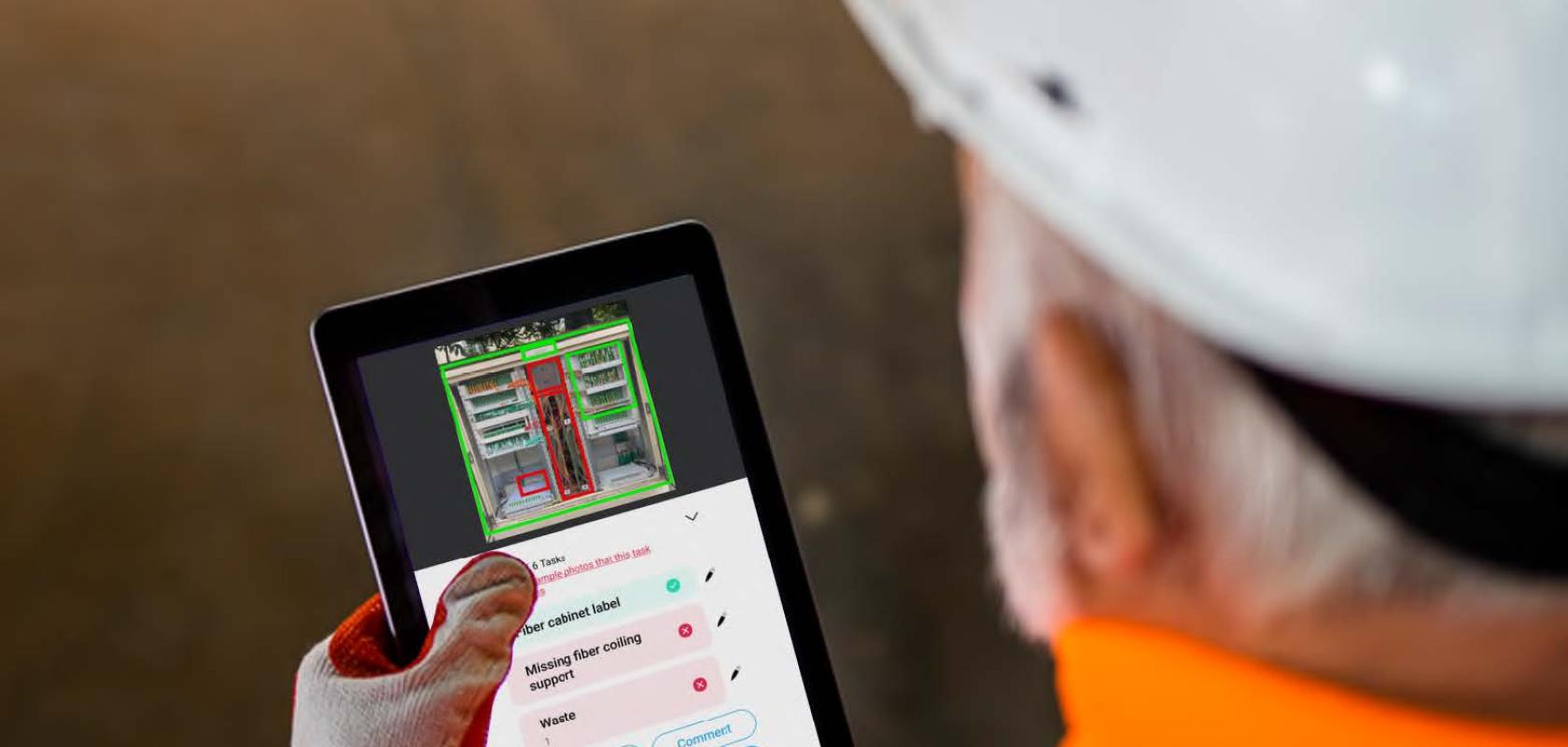In 2025, artificial intelligence (AI) keeps taking its root, with Statista predicting the AI market size to reach $243bn this year, the highest value ever achieved. The data analysis platform also forecasts that the market will show an annual growth rate of 27.67%, resulting in a market volume of $826bn by 2030.
More than 10 years ago, three young technology enthusiasts - Augustin Marty, Aloïs Brunel, and Vincent Delaitre - already had a vision of how AI and automation could bring real benefits to companies operating critical infrastructures, and Deepomatic was founded.

Deepomatic's founders, Augustin Marty, Aloïs Brunel, and Vincent Delaitre
The company developed a computer vision platform for image recognition, with a particular objective in mind. CEO Augustin Marty, explains: “Deepomatic was founded with a clear vision: process automation is essential for achieving operational efficiency. As businesses scale, manual processes can no longer sustain the demands of today's fast-paced economy.”
The evolution of network operations
Deepomatic’s early years saw the company partner with businesses and organisations across various industries to automate business processes, with a consistent focus on using images and photos as data. Images, when analysed through advanced image recognition software, can drive automation and streamline numerous tasks. The firm found its perfect fit in the telecoms sector, Marty says: “The pivotal moment came during the roll-out of fibre optic networks in France. Quality issues were often prevalent, resulting in consumer complaints and unreliable networks. Recognising this opportunity, Deepomatic’s first breakthrough came from addressing a single use case in the telecom sector - fibre connection - which allowed Deepomatic to secure its first clients in France.”
Since then, the firm has gone from strength to strength, employing image analysis to evaluate photos taken by field technicians during fibre network operations, automating quality control and ensuring superior fieldwork outcomes. Its success with its first clients led to the platform’s adaptation for additional telecom use cases, such as fibre network construction and deployment; as well as in the energy sector, for smart meter installations. It has also grown to become an international-footprint tech player covering multiple markets in Europe and North America. Says Marty: “Deepomatic has built a community of prominent client companies that are now leaders in leveraging AI to optimise field operations.”
Breaking new ground in First Time Right Automation
Despite its success, there has been no laurel-resting for the Deepomatic team, with such industry innovation as the creation of a new software category, “First Time Right Automation,” which is designed to place AI at the core of operational excellence by emphasising quality in every field operation.
Network operators in particular, are benefitting from Deepomatic’s innovation and know-how, as Marty explains: “Operators face immense pressure to deploy fibre networks quickly while grappling with a shortage of experienced field staff. Senior employees are retiring, and recruitment of skilled replacements is challenging. This shortage, combined with the need for speed, jeopardises quality. The primary challenge lies in delivering high-quality work at the required pace with the available workforce.”
Marty reveals that many operators still rely on manual quality control processes, where audits occur days or weeks after the work is completed. “On average,” he says, “only 10% of operations are inspected, leaving errors undetected and driving up costs due to human labour and the need for costly revisits to correct mistakes.”
Quality control automation
Enter Deepomatic’s AI solutions, which can automate 100% of quality checks for fibre network construction and operations. By analysing photos taken during fieldwork, the system provides instant feedback to technicians, allowing them to make adjustments on-site. This ensures quality standards can be met at scale, operational costs are reduced, and delays caused by manual audits are eliminated.
And, it’s not just quality control (QC) processes that operators are looking to streamline. As they grow, they seek to be more efficient in many other administrative tasks. Says CPO Aloïs Brunel: “By automating QC, Deepomatic also enables the automation of the payment of subcontractors. This is exemplified by Swisscom - once Deepomatic's AI platform verifies the work completed by field technicians across its four subcontractors, payments to these subcontractors are automatically processed. As a result, compensation is seamlessly triggered upon receipt of verified proof of quality work.”
Industry impact and applications

Deepomatic’s solution is used by different users, such as technicians in the field, and also back-office teams who obtain the data from the AI analysis
So, what are the use cases for Deepomatic’s platform? Well, there are multiple. Fibre network construction and deployment, for example, as Brunel reveals: “Whether networks are built underground or overhead, operators must ensure proper installation of assets, fibre laying in trenches, poles, and chambers, as well as adherence to safety standards. Revisiting sites for corrections can be extremely costly, making quality assurance critical. A notable example is Unifiber in Belgium, which is constructing its network underground. The operator cannot afford errors during construction, as reopening closed trenches would be both time-consuming and extremely costly.”
Another use case comes at the fibre connection stage. Says Brunel: “Customer experience is paramount for minimising churn. Deepomatic’s AI automatically audits technicians’ work during fibre connection operations, ensuring compliance with quality standards. This reduces customer service calls, improves customer satisfaction, and safeguards operator revenues.”
Then there is the network maintenance stage, in which Deepomatic’s AI can assess the physical state of shared fibre assets, such as distribution points, and assign a health score. Brunel says: “This enables operators to prioritise maintenance operations where they are needed most, optimising resource allocation and reducing downtime.”
Looking ahead, Deepomatic is expanding its horizons beyond fibre networks alone. The company sees particular opportunities in mobile network deployment, where operators face similar challenges to fibre rollouts. Deepomatic’s platform can enhance the accuracy of inventory for operators' mobile network sites, ensuring top-quality documentation of interventions, and validating compliance with work standards. Additionally, the company is making inroads into the energy sector, particularly in smart meter installations and smart thermostat systems. Explains Brunel: "The energy sector also presents significant opportunities, particularly in the development and enhancement of infrastructures for efficient energy management.”
AI implementation challenges and solutions
Of course, the adoption of AI is not without its challenges, and one of the biggest of those is in relation to training. CTO Vincent Delaitre explains: “Telecom operators must collect datasets of example photos to train the AI. Additionally, the quality of data used to train AI systems directly impacts their performance in verifying fieldwork. It is therefore important to make sure that the photos will be representative of the environments and various situations field technicians encounter during operations.”
The good news is that Deepomatic employs advanced methodologies, such as fine-tuning state-of-the-art detection models. This approach streamlines the process of dataset building, as it reduces the number of images needed for training, without compromising accuracy, saving both time and costs. On top of this, Deepomatic also leverages years of expertise to offer pre-trained AI models tailored to telecom use cases. This can help to significantly accelerate project deployment and reduce the burden of data collection for operators.
Innovation remains at the heart of Deepomatic's strategy. While currently using Discriminative AI, the company is developing hybrid models incorporating Generative AI to enhance capabilities. It is also planning ahead to further aid field operators, as Delaitre reveals: "They often work in remote areas, basements, or other environments with unreliable or non-existent internet connectivity. This necessitates an AI solution capable of functioning offline to assist on-site technicians. Deepomatic is developing its AI platform to provide offline functionality. This will empower technicians with real-time insights and validation, even in challenging environments, enabling quicker decision-making and reducing the likelihood of errors. For instance, technicians can detect defects and validate repairs on the spot without waiting for internet connectivity, improving productivity and ensuring high-quality work standards.”
The impact of such innovation is clearly a big part of Deepomatic’s success. Today, it has a reach of nearly 30,000 field workers employed by leading operators such as Bouygues Telecom, Vodafone, Altice, Swisscom, CityFibre, Circet, and Solutions 30 use Deepomatic's solution in their day-to-day operations. The platform processes approximately 20 million operations annually, helping to drive improvements in productivity and on-site efficiency.
Find out more about Deepomatic’s AI automation platform


